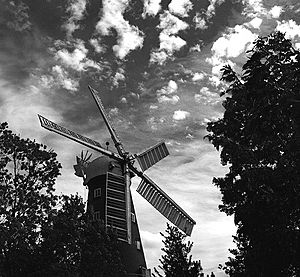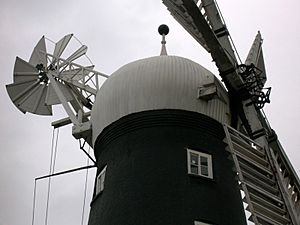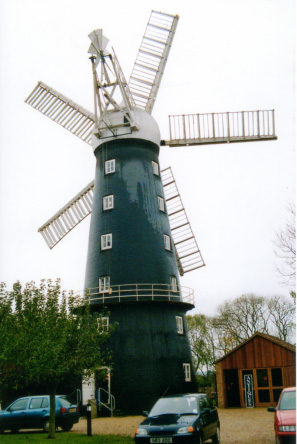Alford Windmill facts for kids
Quick facts for kids Alford Windmill |
|
|---|---|

Alford Windmill, September 2005
|
|
| Origin | |
| Mill location | Alford, Lincolnshire |
| Coordinates | 53°15′56″N 0°11′02″E / 53.2656°N 0.1838°E |
| Year built | 1837 |
| Information | |
| Purpose | Flour mill |
| Type | Tower mill |
| Storeys | Seven |
| No. of sails | Five |
| Type of sails | Patent-Shutter |
| No. of pairs of millstones | Four |
| Other information | |
|
Listed Building – Grade I
|
|
| Designated | 20 May 1953 |
| Reference no. | 1146936 |
| Current Status | Working Windmill Visitor Attraction |
| Website | http://www.alford-windmill.co.uk/default.html |
The Alford Windmill is a special windmill with five sails. You can find it in Alford, Lincolnshire. It's the only one left out of four windmills that used to be there. Today, this windmill works again! It grinds grain to make organic flour. You can even visit it as a fun tourist attraction.
How the Windmill is Built
Alford Windmill is a type of tower windmill. It has seven floors and a special platform around it. The tower is made of bricks and gets narrower towards the top. It's covered in tar to keep out moisture. The top part, called the cap, looks like a white onion. It has a huge fantail at the back and five white sails.
The sails are called "patent-shutter sails." Inside, the mill originally had three pairs of grinding stones. Later, a fourth pair was added. Two pairs were "grey stones" from the Peak District. The other two pairs were French "quartzite" stones.
Inside the Seven Floors
Each floor in the windmill has a different job:
- Ground Floor: This is where a fourth pair of grinding stones is located. An engine outside can power these stones.
- Storage Floor: This floor is used for storing things.
- Spout (or Meal) Floor: Here, the ground flour comes out.
- Stones Floor: This floor holds the main grinding stones. There are three original pairs here.
- Lower Bin Floor: This is one of the floors where grain is stored before grinding.
- Upper Bin Floor: More grain is stored here. There's also a hoist to lift sacks of grain.
- Dust or Cap Floor: This top floor lets workers get inside the cap of the windmill.
There's also a large wheel at the bottom of the mill. It's connected by a belt to an engine in a nearby shed. This engine helps grind corn even when there isn't enough wind. In its busiest days, Alford Mill could grind about 4 to 5 tonnes of corn every day!
History of Alford Windmill
A famous local millwright named John Oxley built this windmill in 1837. It was one of four windmills in the area, but it's the only one that still stands today.
Around the late 1800s and early 1900s, Alford had a few windmills:
- Wallace's or Station Mill: This one had four sails. Only its base is left now.
- Hoyles's Windmill: This was the five-sailed mill we know today as Alford Mill.
- Myers's Windmill: This was a six-sailed mill built in 1827. It was taken down in 1973.
The Hoyles family were the last people to run the windmill for business. Harry Hoyles bought it in the early 1900s. His sons, Walter, Arthur, and Winston, continued the milling and baking business until 1955. During this time, the mill was known as Hoyles's Mill.
The business closed in 1955 because new technology made it harder for windmills to compete. In 1957, Fred Banks bought the mill. He owned another mill and worked to restore Alford Windmill. After this, it became known as the Alford Windmill.
In 1978, Fred Banks had to replace the mill's cap and all five sails. That same year, the Lincolnshire County Council took over the mill. They spent many years restoring it to its beautiful state today. The mill was leased to Mr. Banks until 1986. Then, James Waterfield took over in 1987. Later, Geoff Dees leased it. Since January 2010, Ian Shepherd has been the current lease holder.



